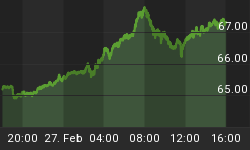Late last week the markets were shocked by a surprisingly bad May jobs report - the worst monthly report in nearly six years. The experts expected the US economy to add 160,000 jobs in May, but it turns out only 38,000 jobs were added. And to make matters worse, 13,000 of those 38,000 were government jobs! Adding more government employees is a drain on the economy, not a measure of economic growth. Incredibly, there are more than 102 million people who are either unemployed or are no longer looking for work.
Gold reacted to the report quickly and decisively, gaining 2.5 percent to $1,243 per ounce on Friday. Gold mining stocks also saw significant gains on the day.
As recently as late May, there was confident talk about a rate increase when the Federal Reserve meets in June. Transcripts of the Federal Reserve's April meeting showed that the central bank was seriously considering a June rate hike. With last week's jobs report and other bad news, that is increasingly unlikely. In fact, citing the weak May employment numbers, Goldman-Sachs is now predicting that there is a zero percent chance of a rate hike in June. Of course they also see this as a temporary blip in an otherwise robust economy, predicting a 40 percent chance of a rate hike in July.
I don't mean to rain on Goldman's parade, but there are no miracles between now and July that will propel the economy to where according to their terms a rate hike would be appropriate.
Many will point to the May employment numbers and the weak economy in general and pin all the blame on President Obama. However, Obama is only part of the problem. The real culprit is an economic philosophy shared by both Republicans and Democrats for many decades. It is a belief in the fantasy of effective central economic planning by the Federal Reserve. It is a belief that a central bank can determine better than the free market what interest rates should be. This belief results in mal-investment, spiraling debt, distorted markets, inflation, bubbles, and finally economic depression.
I was not surprised by the lousy May employment numbers. Actually, I am surprised that so many others were surprised. While the "experts" have talked about our "economic recovery" since the crash of 2008, I happen to believe we have been in a recession or even a depression for the past eight years. The government manipulates the statistics to hide how bad the economy really is, until finally a bit of the truth leaks out and everyone seems surprised.
The people sense something is wrong but many don't fully understand what it is. They have been told that more government spending will stimulate the economy and bring back jobs, and that more tinkering with interest rates will finally produce ideal economic conditions. But the real problem is that there is a cancer out there and it needs to be aggressively treated, not handed an aspirin. What we are seeing is an epic failure of the Keynesians who have tricked so many people into believing that economic interventionism can create a perfect economy. They have mismanaged the economy and I am afraid the worst is yet to come.
All is not lost, however. I am encouraged that so many people are seeing through government deception and are turning to the study of Austrian economics to understand what is wrong with our current system and how we can rebuild the economy. Reading Mises and Rothbard is the best way to understand what is really wrong with our economy...and how it can be fixed.















